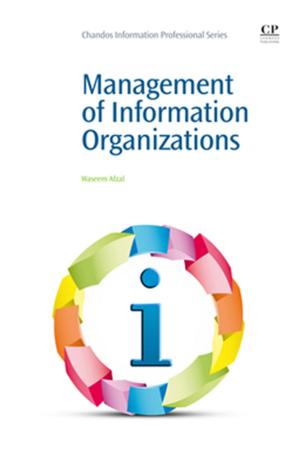Research 2.0 and the Future of Information Literacy
Nonfiction, Reference & Language, Language Arts, Library & Information Services, Computers, Application Software, Business Software, Reference| Author: | Tibor Koltay, Sonja Spiranec, Laszlo Z Karvalics | ISBN: | 9780081000892 |
| Publisher: | Elsevier Science | Publication: | January 22, 2016 |
| Imprint: | Chandos Publishing | Language: | English |
| Author: | Tibor Koltay, Sonja Spiranec, Laszlo Z Karvalics |
| ISBN: | 9780081000892 |
| Publisher: | Elsevier Science |
| Publication: | January 22, 2016 |
| Imprint: | Chandos Publishing |
| Language: | English |
Research 2.0 and the Future of Information Literacy examines possible congruencies between information literacy and Research 2.0, because the work of today’s researcher mobilizes a number of literacies. From among the various types of relevant literacies, at least three types of literacies can be mentioned in this relation: information literacy, scientific literacy and academic literacy. This book addresses these literacies in the light of the changing research landscape. Broad contexts of the researcher’s abilities, as adaptive and innovative thinking, problem solving skills, self-management and design mindset are also examined. Computational thinking and the computational paradigm in a number of fields of research are taken into consideration, as well. Researchers differ to non-researchers when populating social media, which means that these two different groups require different literacies. The relationship between information literacy and information is approached in a new way. Among the multitude of issues, we introduce a new interface between information literacy and Research 2.0. It encompasses the issues of research data management and data literacy, which represent also a challenge both for the academic library and for the communities of researchers. Similarly, the questions of new metrics of scientific output are addressed in the book.
- Summarizes the most important and up-to date approaches towards Research 2.0, including researchers’ skills and abilities, the data-intensive paradigm of scientific research, open science, not forgetting about factors that inhibit a wider uptake of Research 2.0
- Discusses the nature of information literacy in the light of its definitions, declarations and related frameworks and by outlining the new literacies context, reading and writing, the cultural context, and the turns of library and information science
- Numerous literacies, other than information literacy, its relationship to information overload and personal information management are also subject of the book
- Theoretical and practical perspectives are given to enable the understanding of the transformations of information literacy and its relationship to Research 2.0
Research 2.0 and the Future of Information Literacy examines possible congruencies between information literacy and Research 2.0, because the work of today’s researcher mobilizes a number of literacies. From among the various types of relevant literacies, at least three types of literacies can be mentioned in this relation: information literacy, scientific literacy and academic literacy. This book addresses these literacies in the light of the changing research landscape. Broad contexts of the researcher’s abilities, as adaptive and innovative thinking, problem solving skills, self-management and design mindset are also examined. Computational thinking and the computational paradigm in a number of fields of research are taken into consideration, as well. Researchers differ to non-researchers when populating social media, which means that these two different groups require different literacies. The relationship between information literacy and information is approached in a new way. Among the multitude of issues, we introduce a new interface between information literacy and Research 2.0. It encompasses the issues of research data management and data literacy, which represent also a challenge both for the academic library and for the communities of researchers. Similarly, the questions of new metrics of scientific output are addressed in the book.
- Summarizes the most important and up-to date approaches towards Research 2.0, including researchers’ skills and abilities, the data-intensive paradigm of scientific research, open science, not forgetting about factors that inhibit a wider uptake of Research 2.0
- Discusses the nature of information literacy in the light of its definitions, declarations and related frameworks and by outlining the new literacies context, reading and writing, the cultural context, and the turns of library and information science
- Numerous literacies, other than information literacy, its relationship to information overload and personal information management are also subject of the book
- Theoretical and practical perspectives are given to enable the understanding of the transformations of information literacy and its relationship to Research 2.0















